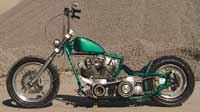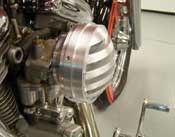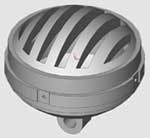3D Designs Lend Process Transparency, Improved Communication
This shop wanted to use a CAD system to replace its 2D pencil-and-paper designs. CimatronE software helped the shop streamline its design process while saving valuable machining time on the shop floor.
Share


ECi Software Solutions, Inc.
Featured Content
View More



.png;maxWidth=45)
DMG MORI - Cincinnati
Featured Content
View More
Autodesk, Inc.
Featured Content
View More

Hwacheon Machinery America, Inc.
Featured Content
View MoreWith a passion for motorcycles and expertise in engineering, industrial design, welding and fabrication, brothers Dave and James Kaye started Detroit Brothers Custom Cycles, a small-scale manufacturer of custom motorcycles. Since 2002, the brothers have focused on a small segment of the motorcycle crowd, aiming to offer distinctive designs that speak to a new generation of riders.
“Our bikes are unique,” Dave Kaye says. “They appeal to riders like me and my brother—the generation that used to snowboard and ride BMX bikes when we were younger.”
With a background in industrial design and engineering, Dave has a flair for designing creative bikes and parts. James, a classically trained sculptor and artist from the Center of Creative Studies in Detroit, brings years of welding and fabrication experience to the operation. Dave does much of the initial design and conceptualization of new motorcycles before James begins fabrication work. In addition to the brothers, the shop’s staff includes three fabricators and two mechanics, as well as a few interns and part-time employees.
At first, Dave designed bikes manually, making paper-and-pencil drawings that were passed to the machinist and entered into the CNC milling machine. The shop sought to replace this process with a single CAD software that would be easy enough to use in a small shop environment, yet capable enough to enable quick design of everything from an entire motorcycle to a single part.
Because all the bikes are custom-made, communication with customers is essential. Customers are often apprehensive about investing a considerable amount of money into a product that they won’t see until it is finished, the company says. Thus, to avoid unwelcome surprises along the way, the shop needed a way to show customers custom product designs upfront so they would have a better idea of what they were getting.
To meet these challenges, the brothers invested in Cimatron’s 3D CAD/CAM software, CimatronE version 8. Dave says two of the software’s key benefits are its transparency and intuitive user interface. In fact, he was able to start using the program to create designs within a few hours.
“I’ve worked on a fair share of different CAD programs, and I’ve never found that I could just poke around and figure it out,” Dave says. “I’m not really a big ‘let’s read the manual’ kind of guy. With Cimatron, you instantly know what the tools are and what they do, versus some other programs that are confusing and inaccessible unless you’re formally trained.”
Another feature the shop likes is Cimatron’s ability to represent each bike component as part of an overall assembly. That way, any changes the customer wants can be made virtually, and the shop can use the software as a proposal or sales tool. Dave inputs each and every part he designs into the software’s built-in catalog. He can then print a build/order list that details all the components needed to complete the assembly, including both custom-designed parts and items such as bushings or washers that the shop orders from outside suppliers. These assembly features also allow the shop to easily change small component details, such as the angle of a steering neck, in order to create a totally different bike design.
The shop’s customers can now view full 3D models of their bikes before receiving the finished product. In addition, the software has helped streamline the internal process of taking designs into production. With the previous method, the shop had to program its machines based on its paper-and-pencil designs. The ability to program cutting paths and other features in the CAM side of Cimatron saves a great deal of time, the company says.
“There’s no guesswork,” Dave says. “The machinist can load the files directly into the milling center, and the people at the shop know exactly what they’re supposed to be doing because they know what the bike will look like.”
Read Next
Building Out a Foundation for Student Machinists
Autodesk and Haas have teamed up to produce an introductory course for students that covers the basics of CAD, CAM and CNC while providing them with a portfolio part.
Read MoreRegistration Now Open for the Precision Machining Technology Show (PMTS) 2025
The precision machining industry’s premier event returns to Cleveland, OH, April 1-3.
Read More5 Rules of Thumb for Buying CNC Machine Tools
Use these tips to carefully plan your machine tool purchases and to avoid regretting your decision later.
Read More








.png;maxWidth=150)






























.jpg;maxWidth=300;quality=90)





